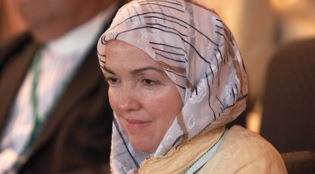 loading
loading
Love thy neighbor Bob HandelmanIngrid Mattson, president of the Islamic Society of North America, attended the week-long conference at Yale Law School. View full imageReminders of the urgency of peacemaking between Muslims and Christians were everywhere. Security was high, as police shut down part of Wall Street and circled the Law School with dogs. Just as the public part of the conference began, on July 29, news reports came out of a death threat from al-Qaeda against King Abdullah of Saudi Arabia for hosting an interfaith meeting recently in Madrid. "How do you respond to al-Qaeda? My response is coming to Yale to participate in this," says Shaykh Habib Ali Z. A. al-Jifri, a widely popular Muslim speaker. Habib Ali al-Jifri is general director of the Tabah Foundation, in Abu Dhabi, which researches Islam and contemporary issues. The many other Muslims who chose to participate included Ayatollah Seyyed Mostafa Mohaghegh Damad, head of Islamic Studies at the Academy of Sciences of Iran; Sultan Muhammad Sa'ad Ababakar, the leader of Nigeria's Muslims; Shaykh Mustafa Ceric, the grand mufti of Bosnia and Herzegovina; and Shaykh Tayseer Rajab al-Tamimi, the chief Islamic Justice of Palestine. While mainline Protestants and Catholics routinely show up at interfaith events, the Yale conference differed in its substantial contingent of evangelicals, a community generally more skeptical of Islam. Rev. Leith Anderson, president of the National Association of Evangelicals, attended the meeting. So did Geoff Tunnicliffe, international director of the World Evangelical Alliance; Rev. Robert Schuller, host of the Hour of Power television ministry; and David Neff, executive editor of Christianity Today. The world, participants said, is growing more religious, not less, and more dangerous. Prince Ghazi bin Muhammad bin Talal of Jordan, chair of the board of the Royal Aal al-Bayt Institute for Islamic Thought (and a sponsor of the 2007 Common Word letter, as well as a principal of the Yale conference), named several factors that have stoked profound tensions between Christians and Muslims—terrorism, U.S. foreign policy (especially the war in Iraq), the status of Jerusalem in the Israeli-Palestinian conflict, religious fundamentalism, and missionary work. "As a person of faith, it's hard to avoid a sense of regret about all the ground we've lost in a few short years in our quest for interfaith tolerance and understanding," said Senator John Kerry ’66 in a speech at the conference. "We've barely broken the seal on the twenty-first century, but already it's been marked not just by burning buildings and occupying armies and riots and roiling images of bloodshed and humiliation, but also by an even more widespread and dangerous worry—by a question you hear whispered and spoken quietly: what if we can't live together?" Domestic and foreign polls of Muslims and Christians in recent years reveal a high level of suspicion between them, yet also an unwillingness among majorities of both faiths to concede that conflict is inevitable. A BBC poll published in 2007 found that a majority of Muslims and non-Muslims in 27 countries believe that "common ground can be found." American evangelicals, however, are more likely than other Christians to have an unfavorable opinion of Islam. In a 2007 study by the Pew Center for the People and the Press, about half of white mainline Protestants and white Catholics said they had favorable views of Muslims. Only a quarter of white evangelicals did. "What's going on at the grassroots is that conservative evangelicals have a specific set of worries about this process," says Rev. Joseph Cumming, a conference organizer and the director of the Reconciliation Program at the Divinity School's Center for Faith and Culture. "They want to know, are we going to sweep under the carpet certain core Christian doctrines—such as the Trinity, the deity of Christ, and the cross -- and the persecution of Christians in Muslim majority countries? They ask, were we right to apologize for the Crusades in our response to 'A Common Word' when Muslims have done bad things, too?" He adds: "At the conference, we talked a lot about doctrine, but that doesn't mean we came to a complete meeting of the minds." The participants did readily come together on the importance in both faiths—and in Judaism too—of loving God and one's neighbor. Some differences were apparent. Grand Mufti Ceric, of Bosnia and Herzegovina, said that some people might be "arrogant" and not deserving of love; Habib Ali al-Jifri, in his speech, said that because God chose and created your neighbors, they are worthy of your love. Muslims gained a clearer understanding of the Trinity and original sin; Christians, of the love Muslims have for the prophet Muhammad, for the prophets who preceded him (including Jesus), and for the Koran. Muslims said they were pleased that Christians were starting to talk about a "Judeo-Islamo-Christian" tradition with common roots. "Dialogue doesn't mean closing off theology to one another but understanding each other for a better life," says Ayatollah Damad. "The problems that cause conflict between these groups aren't theological. It is political matters."
|
|